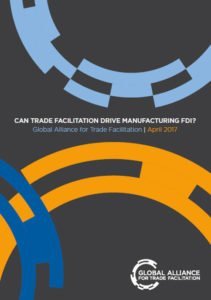A new report from the Global Alliance for Trade Facilitation looks at how better trade facilitation can improve inclusive economic development.
 While FDI played a starring role in East Asia’s manufacturing success story in the 1980s and 1990s, investment remains concentrated in Southeast Asia and larger emerging economies—largely keeping Africa, for instance, from sharing in its spoils. As a new report from the Global Alliance for Trade Facilitation points out, only 5% of Sub-Saharan Africa’s FDI goes to the manufacturing sector. As many countries that have missed out on manufacturing FDI also tend to have higher trade costs and weak trade facilitation environments, the report analyses the relationship between these elements and delivers a powerful conclusion.
While FDI played a starring role in East Asia’s manufacturing success story in the 1980s and 1990s, investment remains concentrated in Southeast Asia and larger emerging economies—largely keeping Africa, for instance, from sharing in its spoils. As a new report from the Global Alliance for Trade Facilitation points out, only 5% of Sub-Saharan Africa’s FDI goes to the manufacturing sector. As many countries that have missed out on manufacturing FDI also tend to have higher trade costs and weak trade facilitation environments, the report analyses the relationship between these elements and delivers a powerful conclusion.
In recent years, world trade has seen complex global value chains multiply, where a country may specialise in manufacturing a single component of a multinational company’s final product, such as the screen on your smartphone, for example. Manufacturing FDI can act as a strong job creator by supporting economies’ integration into global value chains.
As such, FDI in manufacturing has been crucial to emerging economies’ success stories. Morocco, for example, has attracted over US$3 billion in FDI since 2011, two-thirds of which went into manufacturing automotive components. Sri Lanka has attracted over US$1 billion in manufacturing FDI over the same period – and while it constituted less than one third of total investments in the country, it accounted for more than two thirds of total jobs created by foreign investment, demonstrating the strong job creation value of FDI to the manufacturing sector
So what does manufacturing FDI have to do with trade facilitation? In order for a production line spread across continents to function, smooth and predictable cross-border trade is essential. Trade facilitation refers to processes aimed at clearing goods across borders as quickly and predictably as possible, e.g. speeding up customs clearance or making customs procedures more transparent.
More specifically, the report found that improving the trade facilitation environment by 1% corresponds with a 3.2% increase of FDI into manufacturing. While this does not imply causation, the report argues it points to the importance of trade facilitation in attracting and retaining investment. Developing economies with strong trade facilitation environments were also found to attract high-value investments, especially in desirable industries such as auto parts and aerospace manufacturing.
“Although a number of factors drive investment decisions, the ability to move goods across borders efficiently and predictably is one of the most vital,” said Alliance Director Philippe Isler.
Last February, the World Trade Organisation’s (WTO) Trade Facilitation Agreement (TFA) formally entered into force. According to WTO estimates, full implementation of the agreement could create around 20 million jobs—the majority in developing countries.
